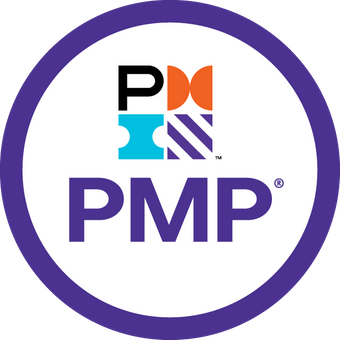
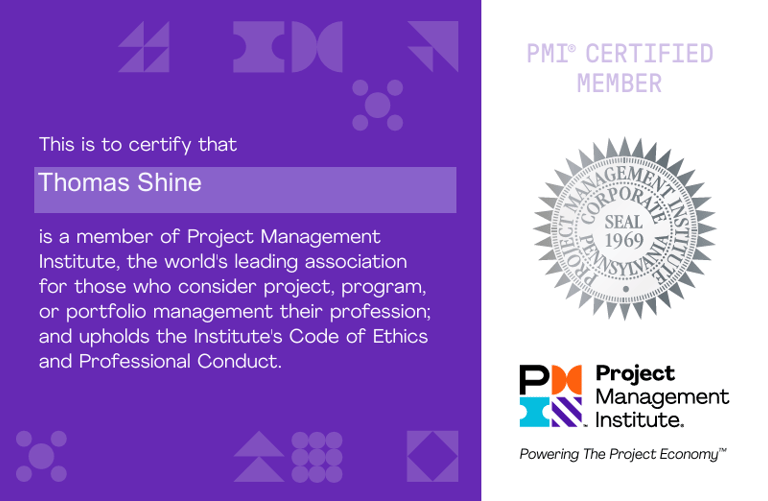

Project Management Institute
Project Management Institute (PMI) is the world's leading association for project, program and portfolio management professionals. Founded in 1969, PMI delivers value for more than three million professionals working in nearly every country in the world through global advocacy, collaboration, education and research. PMI advance careers, improve organisational success and further mature the project management profession through globally-recognised standards, certifications, and other resources.
Qualifications
Project Management Professional (PMP)®
PMI Agile Certified Practitioner (PMI-ACP)®
PMP and ACP Project and Program Manager
PMI Agile Certified Practitioner (PMI-ACP)®
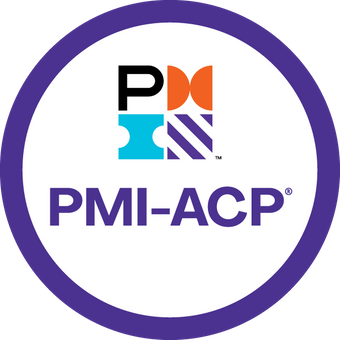

Issued by Project Management Institute (PMI)
Holders of the PMI-ACP (Agile Certified Practitioner) certification are recognised for several key attributes and competencies:
Proficiency in Agile Principles and Practices: PMI-ACP certification signifies a deep understanding of Agile methodologies, principles, and practices. Holders of PMI-ACP are recognised for their ability to apply Agile frameworks such as Scrum, Kanban, Lean, and Extreme Programming (XP) to manage and deliver projects effectively.
Adaptability and Flexibility: PMI-ACP certification demonstrates the ability to adapt to changing requirements, priorities, and environments inherent in Agile projects. Holders of PMI-ACP are recognised for their agility and flexibility in responding to evolving stakeholder needs and market conditions.
Leadership in Agile Teams: PMI-ACP-certified professionals are known for their leadership skills in Agile environments. They are recognised for their ability to lead cross-functional Agile teams, facilitate collaboration, and empower team members to deliver high-quality results.
Continuous Improvement and Learning: PMI-ACP certification highlights a commitment to continuous improvement and learning. Holders of PMI-ACP are recognised for their dedication to enhancing Agile practices, embracing new techniques, and staying abreast of industry trends and developments.
Stakeholder Engagement and Communication: PMI-ACP certification emphasises strong communication skills and effective stakeholder engagement. Holders of PMI-ACP are recognised for their ability to communicate project goals, progress, and impediments transparently and collaborate closely with stakeholders to achieve project success.
Risk Management and Problem-Solving: PMI-ACP-certified professionals are proficient in identifying, assessing, and mitigating risks in Agile projects. They are recognised for their proactive approach to problem-solving, facilitating quick decision-making, and ensuring project delivery within scope, schedule, and budget constraints.
Overall, holders of the PMI-ACP certification are recognised as skilled Agile practitioners who possess the knowledge, skills, and mindset to lead successful Agile projects and deliver value to stakeholders in dynamic and fast-paced environments.
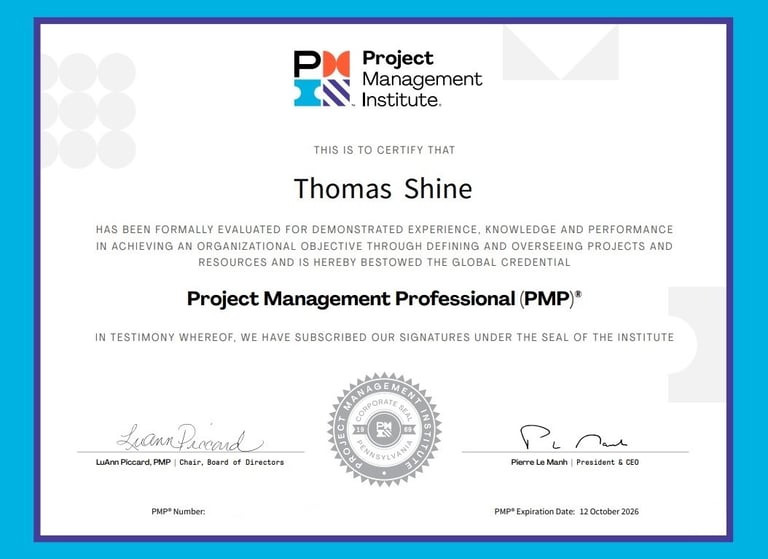

Project Management Professional (PMP)®
Issued by Project Management Institute (PMI)
Holders of the Project Management Professional (PMP) certification are recognised for several key attributes and competencies:
Expertise in Project Management: PMP certification signifies a high level of proficiency in project management principles, practices, and techniques. Holders of PMP are recognised for their ability to effectively initiate, plan, execute, monitor, control, and close projects across various industries and domains.
Leadership and Team Management: PMP certification indicates strong leadership skills and the ability to effectively manage project teams. PMP holders are recognised for their capability to motivate team members, foster collaboration, resolve conflicts, and facilitate communication to drive project success.
Risk Management and Problem-Solving: PMP-certified professionals are known for their expertise in identifying, assessing, and mitigating project risks. They are recognised for their proactive approach to problem-solving, decision-making, and adapting to changing circumstances to keep projects on track and within scope.
Strategic Planning and Business Acumen: PMP certification demonstrates a strategic mindset and business acumen. Holders of PMP are recognised for their ability to align project objectives with organisational goals, prioritise projects based on strategic value, and maximise return on investment for stakeholders.
Quality Management and Continuous Improvement: PMP-certified professionals are known for their commitment to delivering high-quality project outcomes. They are recognised for their proficiency in implementing quality management processes, monitoring project performance, and driving continuous improvement initiatives to enhance project delivery capabilities.
Stakeholder Engagement and Communication: PMP certification highlights strong communication skills and the ability to engage with stakeholders effectively. PMP holders are recognised for their capability to manage stakeholder expectations, negotiate agreements, and communicate project status, risks, and issues in a clear and concise manner.
Overall, holders of the PMP certification are recognised as experienced and competent project managers who possess the knowledge, skills, and attributes to lead and deliver successful projects in today's dynamic and complex business environment.
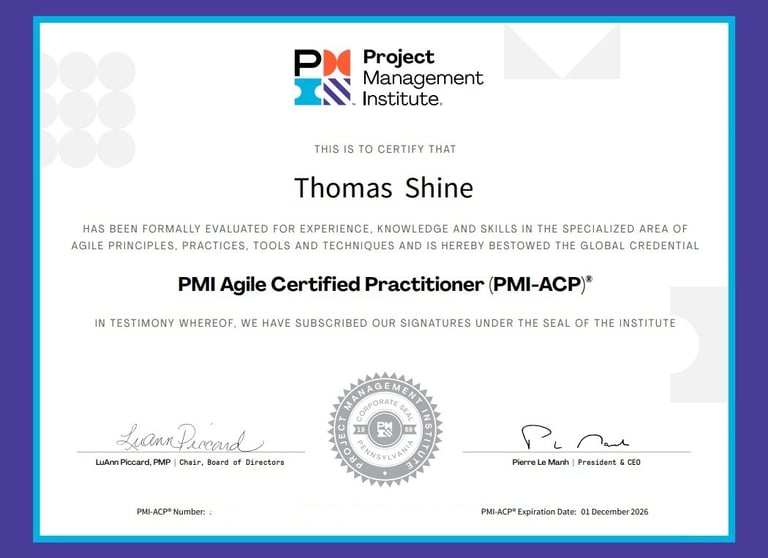

Generative AI Overview for Project Managers
Issued by Project Management Institute (PMI)
Generative AI Overview for Project Managers is a hands-on learning experience for project professionals that empower you with practical knowledge of AI in project management that you can apply right away to your project management approaches.
Every project is unique—and brings with it a set of hurdles and challenges. And it takes a human touch to navigate it all. With the right skill set and embrace of AI, you can do more than ever before to meet every challenge that comes your way.
Definitions of Artificial Intelligence (AI) and Generative AI
Generative AI applications in project management
AI project manager tools that can be used to maximise efficiency
Best practices for project management in AI as a way of working
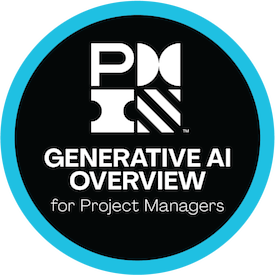

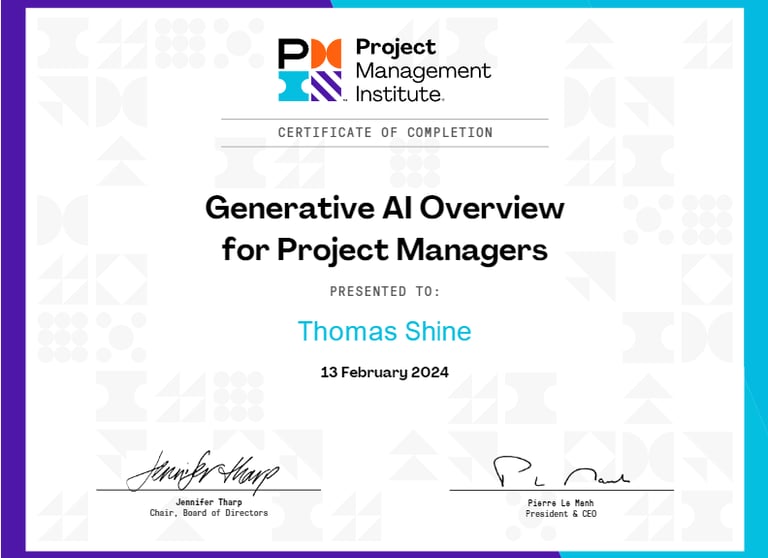

Data Landscape of GenAI for Project Managers
Issued by Project Management Institute (PMI)
Understand the essential concepts around data and generative AI models, including types of data that can be used with GenAI models and the role of the quality, volume, and variety of data. Badge earners can discuss data governance, risks, and limitations of GenAI, and common security threats. The GenAI Data Landscape Canvas for Project Managers offers a structured path to work with data and GenAI to collaborate with organisation experts to improve project outcomes.
Identify a selection of generative AI tools to assist in your project work
Understand Generative AI applications in project management
Utilise best practices for using AI as a way of working in project management
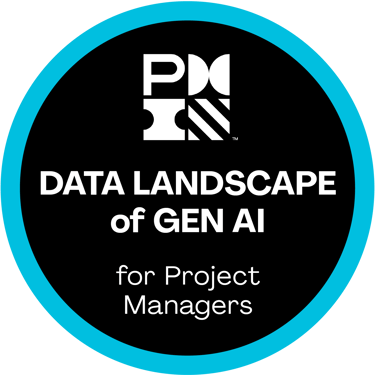

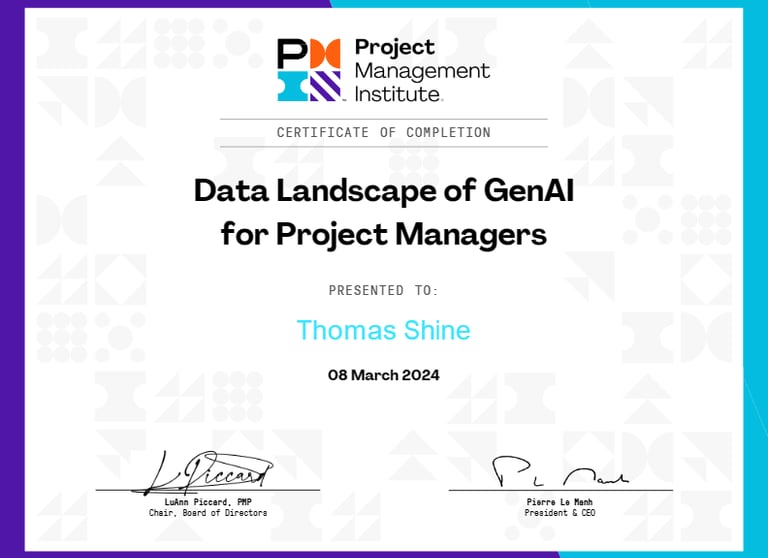

Talking to AI: Prompt Engineering for Project Managers
Issued by Project Management Institute (PMI)
Effectively interact with Large Language Models by creating quality prompts using specific patterns and techniques to generate relevant, accurate, and tailored responses to improve project outcomes. Badge earners will iteratively refine prompts using proven techniques to improve project outcomes and will watch fellow project managers use prompts in their daily work to save time and increase effectiveness.
Design prompts in accordance with several expert prompt engineering techniques to improve project management efficiency and effectiveness.
Iteratively refine prompts to squeeze the most out of LLMs to improve project outcomes
Recognise characteristics of well-designed prompts tailored for project management tasks
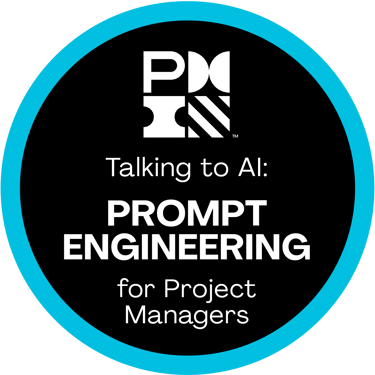

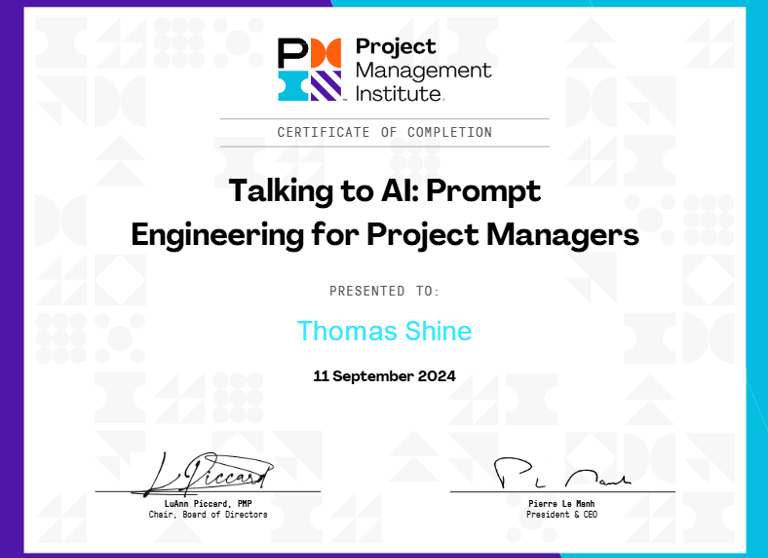




I utilise a suite of industry-leading project management tools to efficiently plan, execute, and monitor projects. These tools include:
Microsoft Project: A comprehensive project management software for scheduling, resource allocation, and task tracking.
Jira: A powerful agile project management tool for software development teams, facilitating collaboration and issue tracking.
Confluence: A collaboration software that enables teams to create, share, and collaborate on project documentation and knowledge base.
SharePoint: A web-based platform for document management, collaboration, and content sharing within organisations.
Excel: A versatile spreadsheet software used for data analysis, reporting, and project tracking.
Microsoft Office Suite: A collection of productivity applications including Word, Excel, PowerPoint, and Outlook, essential for communication, documentation, and analysis.
Teams: A unified communication and collaboration platform that integrates chat, video meetings, file sharing, and project management tools.
Zoom: A popular video conferencing software for virtual meetings, webinars, and remote collaboration.
WebEx: Another widely used web conferencing and online meeting platform, offering features for collaboration and remote presentations.
Visio: A diagramming and vector graphics application used for creating flowcharts, diagrams, and visual representations of project workflows.
Draw IO: An online diagramming tool that enables users to create flowcharts, process diagrams, and wireframes collaboratively.
Additionally, I have experience with custom resource management tools tailored to specific project requirements. These tools enable efficient allocation and management of project resources, enhancing project delivery and success.



Contact
Contact
info@tomshine.net
© Tomshine.net 2024

